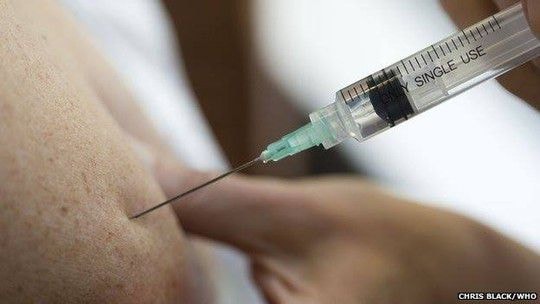Smart syringes help prevent HIV transmission
The World Health Organization (WHO) announced on February 23 that the whole world should switch to using smart syringes (which can only be used once) for vaccination before 2020.
According to WHO, the use of used syringes in vaccination is causing 2 million people in the world to contract dangerous infectious diseases such as HIV/AIDS, hepatitis, etc. The cost of this type of syringe is more expensive than just replacing the needle and reusing the syringe, which is currently applied in many countries around the world. However, WHO believes that the cost of switching to smart syringes will be much cheaper than the amount of money spent on treating infected cases.
 |
| The smart syringe recommended by WHO can only be used once and then discarded. Photo for illustration purposes only. |
Currently, more than 16 billion people in the world are vaccinated each year. Normal syringes can be replaced or not replaced to be reused countless times. But with the smart syringe that WHO is proposing, after injecting once, the piston in the syringe cannot be pulled back and the needle cannot be removed, so this type of syringe cannot be reused.
Dr Selma Khamassi, head of the WHO's vaccine safety team, told the BBC News website: "The replacement of conventional syringes with smart syringes is expected to help eliminate 1.7 million new cases of hepatitis B each year. There are currently 300,000 new cases of hepatitis C and 35,000 new cases of HIV each year, not to mention the unreported figures from other epidemics such as Ebola and Marburg."
There have been many cases of mass infections caused by reusing syringes in the world. WHO once recorded a tragic case in rural Roka (Cambodia). A series of families here, including babies, schoolchildren and 82-year-old elderly people, suddenly tested positive for the HIV virus. The common point among them was that almost all of them were vaccinated by an unlicensed doctor who was suspected of reusing used syringes. Since then, 4 victims here have passed away, including 3 elderly people and 1 baby.
Similar cases have occurred in developed Western countries. In the state of Nevada, USA, there was an outbreak of hepatitis C virus which, according to the investigation results, originated from a doctor who used a syringe to inject many different people.
In addition, the WHO is also calling for the use of sheathed needles to prevent doctors from accidentally pricking their fingers with the needle after injecting a patient. During the recent Ebola outbreak in West Africa, there were several cases of doctors accidentally pricking their fingers with needles.
According toNLDO






